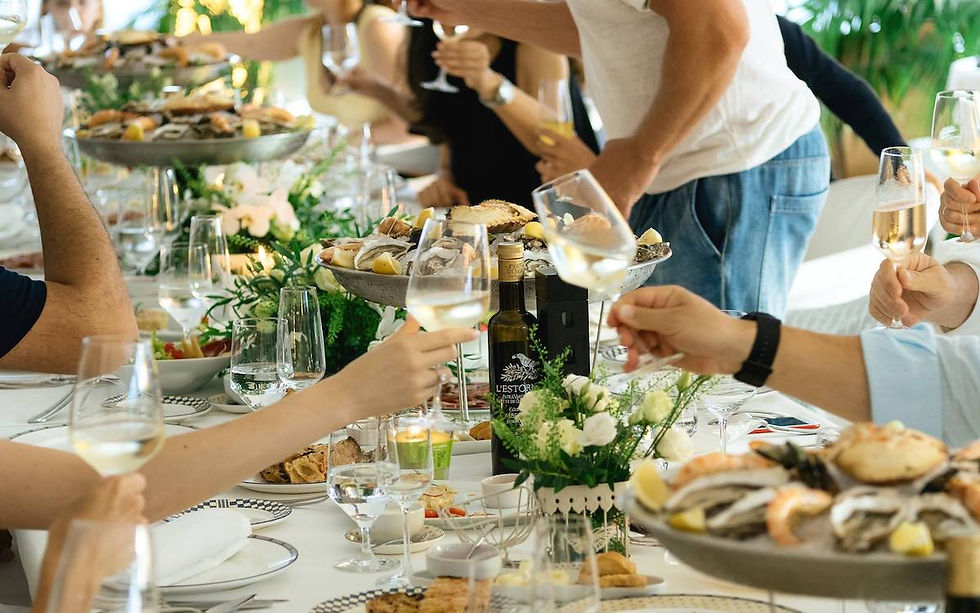What Clients Don’t See When Renting Venues in Spain: 9 Key Factors to Consider
- Nov 3, 2024
- 4 min read
Discover the hidden aspects of venue rentals for events in Spain. Learn what to consider when choosing the perfect location to ensure your event runs flawlessly.

Uncover the hidden aspects of venue rentals for events in Spain. Learn what to pay attention to when selecting a venue for your celebration to ensure your event runs perfectly.
At first glance, renting venues for events in Spain may seem like a simple task. Clients often envision stunning castles nestled in the mountains, estates with large gardens on the edge of the woods, or grand medieval-style mansions in the fields. But what lies behind this picture-perfect image? What remains unseen by the clients?
At Casamiga Events, we work tirelessly to find the perfect venue for every event. In this article, we will discuss the factors that are crucial to consider when choosing a venue for your event.
1. Neighbors and Noise Levels
One of the first questions is whether it’s possible to make noise at the venue and until what time. Spain has strict noise regulations, especially in populated areas. Local laws require a permit for loud music outdoors after 11:00 PM. Without it, events may be interrupted, and police intervention is not uncommon.
We always clarify in advance whether it’s possible to organize late-night and noisy celebrations. Before the event, the venue owner must obtain permission from the district administration to use loud music after 11:00 PM. However, the administration doesn’t always grant permission for noisy events.
Additionally, the event organizer should also negotiate with the neighbors, informing them about the plans to "make noise" and ideally obtaining their consent (typically verbal). If the neighbors are against the noise and you decide to go ahead, you may face a police intervention, and the authorities will determine the next steps.Some venues in Spain have permanent permits for noisy events, but even then, restrictions on time are in place, usually until 3 or 4 AM.
2. Flexibility of the Venue Owner in Case of Emergencies
In the event of unforeseen circumstances, it’s crucial that the venue owner is flexible and open to changes. Whether it's a last-minute change in the event plan or additional requests, the venue owner must be willing to accommodate. We always assess how flexible the venue owner is during negotiations.
3. Suitability of the Venue for Event Requirements
While venues may appear beautiful, they can hide issues that are important for the successful execution of the event. For example, substandard kitchens may be unsuitable for Michelin-starred chefs, or unclean venues may ruin the overall experience. A luxurious castle may turn out to be unfit for specific types of events. Michelin-starred chefs, whom we invite for catering, require appropriate working conditions.
Is everything clean?
Is the hygiene of the premises up to standard?
Do all doors close, and do all windows open?
We check all these details: from cleanliness to the functionality of the equipment and access to necessary facilities. After all, sometimes the event extends beyond the banquet, and we accommodate guests in nearby hotels.

4. Ceiling Height
Ceiling height at the venue can be a crucial factor for decorations and technical setup. High ceilings allow for large stages and lighting shows, while low ceilings require adjustments to the design or a different venue altogether.
5. Access for Large Equipment
A venue may have the perfect location, but if it's not accessible by trucks carrying equipment and decorations, it's a major drawback. We always verify if the venue has access for large vehicles.
For example, if there’s no convenient access for trucks, we won't be able to deliver, unload (and later reload) decorations and equipment for a large event. Therefore, such venues are not suitable for most of our events.
6. Availability of Furniture
Some venues may be inexpensive but empty, requiring you to bring in or rent furniture — adding to the client's overall costs. On the other hand, some venues may be pricier but come fully furnished, significantly reducing additional expenses. We take these factors into account when selecting a venue.

7. Plan "B" for Rain
Having a backup plan for bad weather is essential. The venue must offer the option to host the event under a roof or the possibility of setting up a large tent.
8. Other Events at the Venue
The venue’s availability before and after your event is an important aspect for organizing the installation and removal of equipment. If there are other events scheduled right before or after, it can impact your timeline. This is crucial for us to understand for the following reasons:
Can we arrive early to set up the equipment, stage, and decorations?After the event, will we need to quickly dismantle the equipment at night, or will we be able to do it at a more relaxed pace the next day?How much extra will the owner charge if we arrive early or leave late?
9. Do You Need to Rent the Entire Hotel?
If the event lasts several days, renting the entire hotel for guests and the organizing team can be a cost-effective solution. This ensures convenience and saves costs for the client. In this case, we also place our team in the same hotel to be available 24/7. Moreover, booking the entire hotel is often cheaper for the client.

Our Approach to Venue Selection
The beauty of a venue and the friendliness of its owner are just the tip of the iceberg. For your event to be truly successful, comfortable, and of high quality, we delve deeply into every aspect of the potential venue and examine every detail.



